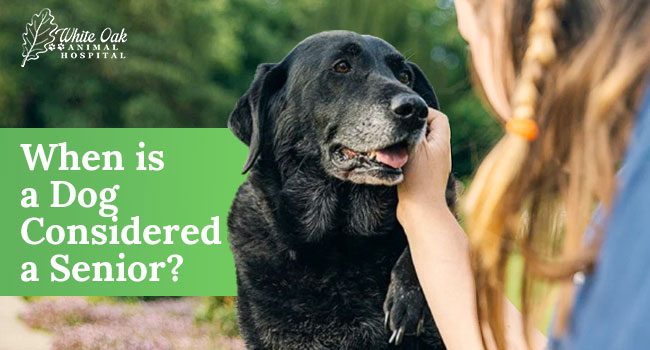
When is a dog considered a senior? While there is no definitive age for when is a dog considered a senior, most sources agree that dogs are generally regarded as seniors around seven years old for large breeds and ten years old for small breeds. Determining when a dog transitions to senior status is an essential consideration for pet owners. Recognizing the signs of aging allows owners to adapt care to meet their dog’s changing needs.
However, the shift to seniorhood depends on many factors like breed, size, and overall health. Paying attention to changes in your dog’s behavior and activity can help identify when they are entering their golden years. Monitoring for age-related health issues is essential for providing the best care as your dog becomes a senior. Understanding when a dog is considered a senior can help owners be prepared for this transition.
When is a Dog Considered a Senior?
 When is a dog considered a senior? it largely depends on its breed and size. On average, larger breed dogs reach senior status earlier, around ages 6-8, while smaller breeds don’t become seniors until around 10-12. Understanding when a dog transitions to its golden years allows owners to provide appropriate veterinary care, nutrition, exercise, and support.
When is a dog considered a senior? it largely depends on its breed and size. On average, larger breed dogs reach senior status earlier, around ages 6-8, while smaller breeds don’t become seniors until around 10-12. Understanding when a dog transitions to its golden years allows owners to provide appropriate veterinary care, nutrition, exercise, and support.
Larger breeds like Great Danes and Mastiffs tend to have shorter lifespans and thus reach senior status sooner. Their average life expectancy is only 6-8 years, so they are often considered seniors by age 5 or 6. Smaller toy breeds like Chihuahuas and Yorkshire Terriers have longer life expectancies of 15-20 years, so they may not be deemed seniors until around age 10. The disparity is due to larger dogs’ rapid growth and cell turnover rates, which cause earlier onset of age-related changes. A dog’s weight also correlates with when that dog is considered a senior.
Overweight or obese dogs experience accelerated aging and often show signs of seniority sooner. Excess weight puts more strain on joints and internal organs. Keeping dogs at an optimal weight for their breed and size can help delay some senior health issues. Understanding breed-specific aging patterns and maintaining ideal weight helps dog owners recognize the transition to seniority and adapt care appropriately. When is a dog considered a senior? It varies, but being aware of changes can help pet owners provide the best care.
Physical and Behavioral Changes
 The shift from adulthood to seniority brings many physical and behavioral changes in dogs. Mobility often decreases as joints stiffen, energy levels decline, and graying fur and cloudy eyes become more apparent. Dogs sleep more as senior citizens and may be less keen to play or go on long walks. Increased vocalization, like whining or barking, can signify cognitive decline. Anxiety when separated from owners is common. Dietary needs evolve to compensate for reduced activity. Owner attentiveness to these subtle shifts helps ensure a smooth transition to a dog’s golden years. Providing ample comfort can ease this process. Understanding “when is a dog considered a senior” is critical to detecting these changes.
The shift from adulthood to seniority brings many physical and behavioral changes in dogs. Mobility often decreases as joints stiffen, energy levels decline, and graying fur and cloudy eyes become more apparent. Dogs sleep more as senior citizens and may be less keen to play or go on long walks. Increased vocalization, like whining or barking, can signify cognitive decline. Anxiety when separated from owners is common. Dietary needs evolve to compensate for reduced activity. Owner attentiveness to these subtle shifts helps ensure a smooth transition to a dog’s golden years. Providing ample comfort can ease this process. Understanding “when is a dog considered a senior” is critical to detecting these changes.
Common Health Concerns
Knowing when your dog reaches senior status allows you to be aware of some of the most common health issues that can arise during their golden years.
 Arthritis is highly prevalent in senior dogs, with over 50% of dogs older than seven years old experiencing the condition. A senior dog may experience some degree of joint degeneration, according to the AKC. Restricted movement, difficulty standing up, and personality changes can indicate arthritis pain. Non-steroidal anti-inflammatory medications are often prescribed to help ease discomfort. Joint supplements can also help senior dogs remain active.
Arthritis is highly prevalent in senior dogs, with over 50% of dogs older than seven years old experiencing the condition. A senior dog may experience some degree of joint degeneration, according to the AKC. Restricted movement, difficulty standing up, and personality changes can indicate arthritis pain. Non-steroidal anti-inflammatory medications are often prescribed to help ease discomfort. Joint supplements can also help senior dogs remain active.
Heart disease affects around 10% of senior dogs, according to the ASPCA. Coughing, exercise intolerance, or fainting may signal heart issues. Medications can treat conditions like valve disease or irregular heart rhythms. Blood pressure checks are advised for dogs once they reach senior status, as hypertension is common. Kidney disease impacts around one in three old dogs later in life, according to VCA Hospitals. Increased thirst/urination, weight loss, or bad breath can point to impaired kidney function. Special kidney diets and medications aid dogs with chronic kidney disease.
When is a dog considered a senior? Knowing this allows you to monitor them for these potential health problems. Annual senior wellness exams enable vets to catch issues early while they remain treatable. Prioritizing preventive care greatly benefits aging dogs.
Holistic Approach to Senior Dog Care
Knowing when a dog is considered a senior is critical for pet owners looking to provide proactive, holistic care. According to vets, larger breeds become seniors around 5-6 years old, while smaller dogs reach senior status at 7-8 years. Once dogs hit these milestones, owners should gradually adjust care routines to support longevity and quality of life.
 A holistic approach focuses on the overall wellness of mind, body, and spirit. For senior dogs, start with nutrition. Consult with your vet about switching to a high-quality senior diet formulated for your dog’s size and activity level. These foods have tailored protein, fat, and calorie levels to maintain ideal weight and muscle mass. Supplements like glucosamine and omega-3s also support joint, brain, and heart health.
A holistic approach focuses on the overall wellness of mind, body, and spirit. For senior dogs, start with nutrition. Consult with your vet about switching to a high-quality senior diet formulated for your dog’s size and activity level. These foods have tailored protein, fat, and calorie levels to maintain ideal weight and muscle mass. Supplements like glucosamine and omega-3s also support joint, brain, and heart health.
Daily, moderate exercise remains essential for senior dogs to maintain muscle tone and joint flexibility, according to the AKC. Short, frequent walks and joint-friendly activities like swimming are ideal. Providing puzzles, toys, and training sessions also stimulates mental sharpness. Monitor your senior dog’s needs and adjust activities to match their capabilities.
Regular veterinary care helps catch issues early. Annual exams and twice-yearly bloodwork/urinalysis screen for conditions like kidney disease, diabetes, and cancer. Twice yearly dental cleanings defend against bacteria causing tooth and gum infections. Blood pressure and heart health checks are advised annually as well.
Emerging research shows links between lifestyle factors and longevity. A Purdue study found overweight dogs had shorter lifespans. Strategies like ideal weight maintenance, antioxidants, and restricting calorie intake later in life may support longevity, according to science journal studies. New therapies like stem cell injections also aim to alleviate arthritis for improved mobility and quality of life.
Pet owners are crucial in helping senior dogs thrive through thoughtful lifestyle adjustments and preventative care. Focusing on whole-body wellness and new scientific findings can extend an old dog’s healthy years. With vigilance and proactive steps, owners have the power to improve longevity and give old dogs their best golden years.
 Knowing when is a dog considered a senior is an essential first step for pet owners to provide timely, thoughtful care. While breeds reach senior status at different ages, vigilance around milestone ages empowers owners to make proactive adjustments to support their aging companions. Small changes across nutrition, exercise, veterinary care, and more can have a significant positive impact on longevity and quality of life.
Knowing when is a dog considered a senior is an essential first step for pet owners to provide timely, thoughtful care. While breeds reach senior status at different ages, vigilance around milestone ages empowers owners to make proactive adjustments to support their aging companions. Small changes across nutrition, exercise, veterinary care, and more can have a significant positive impact on longevity and quality of life.
As a senior dog’s needs evolve, attentive pet owners should partner with trusted professionals like veterinarians to develop thorough, individualized care plans. An invaluable resource is Dr. Casey Damron at White Oak Animal Hospital, with over 28 years of experience skillfully treating over 6,000 pets. Dr. Damron offers integrative care options not found elsewhere in the community, including TCVM telemedicine consultations for holistic wellness support.
By scheduling a comprehensive exam at White Oak Animal Hospital, pet owners can work with Dr. Damron on custom strategies tailored to their senior dog’s needs – from therapeutic diets to advanced diagnostics to innovative therapies that optimize their beloved companion’s golden years. Dr. Damron’s expertise spans everything from arthritis pain management to cancer treatment, providing pet owners with complete veterinary care under one roof.
With a collaborative, proactive approach between pet owners and veterinarians like Dr. Damron, owners can provide their senior dogs the best possible care while cherishing each moment of this extraordinary life stage together. Knowing when is a dog considered a senior and taking action empowers pet owners to guide their aging companions through the silver muzzle journey.
Related Posts
-
Dog Arthritis Herbal Remedy Options For Holistic Pet Parents
Are you seeking a dog arthritis herbal remedy? Treating arthritis in dogs with natural options…
-
All Natural Herbs For When Your Dog is Lethargic
Firstly, if your dog is lethargic suddenly, consult your veterinarian right away. Lethargy may be…
-
Best Herbal Remedies For Pet Vomiting
Pet vomiting can be scary when it lasts longer than a few days. Chronic pet…
-
Learn How to Alleviate Dog Tremors Naturally
Dog tremors are sometimes mistaken for dog seizures. Consult your veterinarian to confirm whether your…









